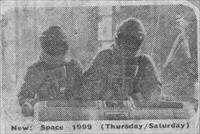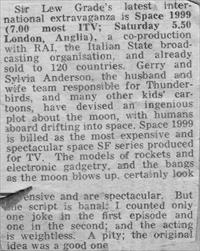UK Press
Space 1999 reviews, September 1975


Sir Lew Grade's latest international extravaganza is Space 1999 (7.00 most ITV; Saturday 5.50 London, Anglia), a co-production with RAI, the Italian State broadcasting organisation, and already sold to 120 countries. Gerry and Sylvia Anderson, the husband and wife team responsible for Thunderbirds, and many other kids' cartoons, have devised an ingenious plot about the moon, with humans aboard drifting into space. Space 1999 is billed as the most expensive and spectacular space SF series produced for TV. The models of rockets and electronic gadgetry, and the bangs as the moon blows up, certainly look expensive and are spectacular. But the script is banal: I counted only one joke in the first episode and one in the second; and the acting is weightless. A pity; the original idea was a good one
Short review from September 1975 in a UK tabloid newspaper (probably Saturday 6th September 1975)
Space 1999 5.50-6.45 ATV to LWT.
Lew Grade's bet is that this one will still be around in 1999 - and with its impressive array of special effects and audio-visual fireworks (by Brian Johnson who did 2001) and the timeless banality of its characters and storylines, that shrewd old showman seems set for a winner. This latest piece of sci-fi nonsense is from the Anderson stable, carefully packaged and guaranteed free from seditious ideas to contaminate youthful minds. The wooden performers of their earlier successes like Thunderbirds and Joe 90 are here replaced by their live counterparts. A multiracial crew of Terrans (led by Martin Landau, Barbara Bain and Barry Morse) find themselves blasted into deep space when their Moon base is pushed out of Earth's orbit by atomic explosions. The series thus set for an endless run through the gamut of science fiction cliches dear to the hearts of its fans. Unfortunately for Londoners it clashes with Dr Who but If you miss it this time round, you can see it again ... and again ... and again ...
Wendy McFadden
Probably 1976. UK inflation peaked at 24% in 1975, dropping to 15% in 1976 and remaining around those levels until the 1980s (for comparison, US inflation peaked at 12% in 1974).
THE FUTURE Is Fantastic, Bigger, Better, More Exciting Than Ever ! proclaims ATV to launch a second season of Space 1999.
What they mean is that the budget has been inflated to £150,000 an episode. making the total cost £600.000 - the most expensive series in TV history.
It also has Catherine Schell, Hungarian baroness by birth, playing the resident out-of-this-world alien.
The script calls for her to be able to turn herself into a lioness, a panther, a tigress, a dove and a dolphin.
Say ATV 'It must be seen to be believed.'
UK tabloid, probably October 1975.
Caption: Sylvia Anderson: "We've got a breathing space"
Suddenly, Sylvia and Gerry Anderson, the British couple who conquered the universe with space-fiction TV puppet series, are worlds apart.
After 16 years of marriage they are separated and facing the down-to-earth reality of a broken marriage.
Together they made puppet shows like Thunderbirds, Stingray, and Captain Scarlet.
Sylvia spoke the voice or the daring Lady Penelope in Thunderbirds.
The couple also master-minded such hits as UFO and the new smash TV series, Space 1999, which has been bought by almost every country which has television.
Now, after rocketing to so much success, and ending up back alone on the launching pad for a new solo career, 43-year-old Sylvia says:
"It's no comfort to me to be alone. But it's a challenge.
"We wrote together and created together and I would eat, drink and sleep my work."
Sylvia is now working on a non-science fiction film -an Anglo-Italian tale of the supernatural called The Lady From The Lake. "I've never been a lonely person." she says. "I don't need a shoulder to cry on."
Sylvia, who lives at Gerrard Cross. Bucks, with her eight-year-old son Gerry, is especially proud of her 22-year-old actress daughter, Dee.
"She's doing very well by herself. She has never asked for help to get on, and she's making it on her own."
Gerry is in America, busy on sci-fi TV work.
Gerry Anderson was probably in America recruiting Fred Freiberger at the time of writing.